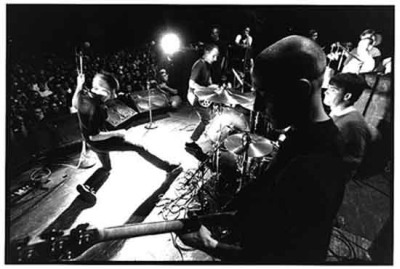 Image via Wikimedia Commons / CC BY 3.0
Image via Wikimedia Commons / CC BY 3.0
There’s a lot of noise in the music world about the changing industry and the role of record labels. We hear stories about how much money players made many years ago, how there are too many bands now, and how it’s much harder to make a living. Sometimes we feel like we’re sailing into the teeth of the gale attempting to play professionally.
But we all still know people who do it. People still want good music, and those who are well funded will always want to invest in talent. Just as technology has given us new paths to creating good recordings, the world of global media has given us new ways to find success and popularity. Sometimes that happens without the benefit of a major label's budget (although, of course, creating your own DIY success will attract attention and ultimately result in offers). Here are the paths of five acts who did just that.
1. O.A.R.: passing tapes
Best known for their hit “Shattered (Turn the Car Around),” these guys started out as four high-school friends who went to college together. At Ohio State University (where they added a fifth player, saxophonist Jerry DePizzo), they worked their natural market, playing fraternities and sororities around the campus. Their marketing plan was simple: play more shows. They performed early and often in their career, skipping formal marketing and publicity and instead relying on word of mouth.
When they realized that their fans were bootlegging their live shows, they encouraged it. As the band’s live reputation grew and they broadened their touring radius, trading live tapes became part of their fan culture and the word continued to spread. Over several years, O.A.R. became a sneaky underground success. Although they eventually enlisted a label, they turned down offers from the majors, choosing to sign with Lava Records.
2. Fugazi: starting your own record company
When recruiting bandmates for a new project, it’s a helpful part of your sales pitch if you can say, “By the way, I own a record label.” As Michael Azerrad of Rolling Stone writes in his book, Our Band Could Be Your Life, singer/guitarist Ian McKaye was co-owner of Dischord Records with several albums under his belt when he formed the band Fugazi. The Washington, DC, band quickly became indie favorites, and their popularity outshined that of McKaye’s previous band, Minor Threat.
But the “Dischord Sound” really encompassed a great diversity of bands. What they shared was not a style, but a DIY aesthetic that favored learning every step of the record-making process rather than allowing a large company to make many of the decisions. This attitude, of course, was perfect for punk rock and its fans, who wanted authenticity above all else and were even willing to accept ragged, spontaneous recordings if they sounded tough, energetic, and sincere.
While Fugazi never had huge mainstream hits, they became legends within the hardcore scene and were a huge influence for legions of young musicians… and label owners.
3. Lindsey Stirling: musical gladiator
How do you get to a billion views on YouTube? That’s right, a billion. It seems inconceivable, but that’s violinist Lindsey Stirling’s number. To move that kind of data, you need to get a bunch of people to know who you are, and Stirling did it by working her way through the vetting process and multiple auditions on the competitive TV show America’s Got Talent.
She didn’t win, at least not officially. The real victory was in appearing on the show at all and getting her music in front of millions of people. This allowed her to connect with a pumped-up fanbase hidden among the millions, people who really responded to her act and wanted more.
Once you have the downloads and ad revenue associated with all those video views, you don’t need a record label – you just need an accountant to count your money, and perhaps a graphic designer to make your album covers.
[How Monetization Works on YouTube]
4. OK Go: clever gimmicks perfectly executed
To be fair, OK Go was locally successful very quickly and did eventually draw the interest of major labels, but this was due in large part to their flair for self-promotion. Working in a large market (Chicago), they flyered heavily and managed to open up for a number of big acts passing through on tour. Their cheery songs, goofy-hipster charm, and memorable name all converge to create a strong aesthetic.
But it’s their visuals that have made them famous. Who hasn’t seen their astonishing video for “This Too Shall Pass”? Each of their legendary one-take videos seemed to up the ante, offering some sort of clever gimmick that pushed the boundaries of what a group of humans could accomplish in front of a camera in three or four minutes. These feats created word-of-mouth buzz… which is most likely why you’ve heard of the group.
Jesse Sterling Harrison is an author, recording artist, and part-time farmer. He lives in Massachusetts with his wife, three daughters, and a herd of ducks.







